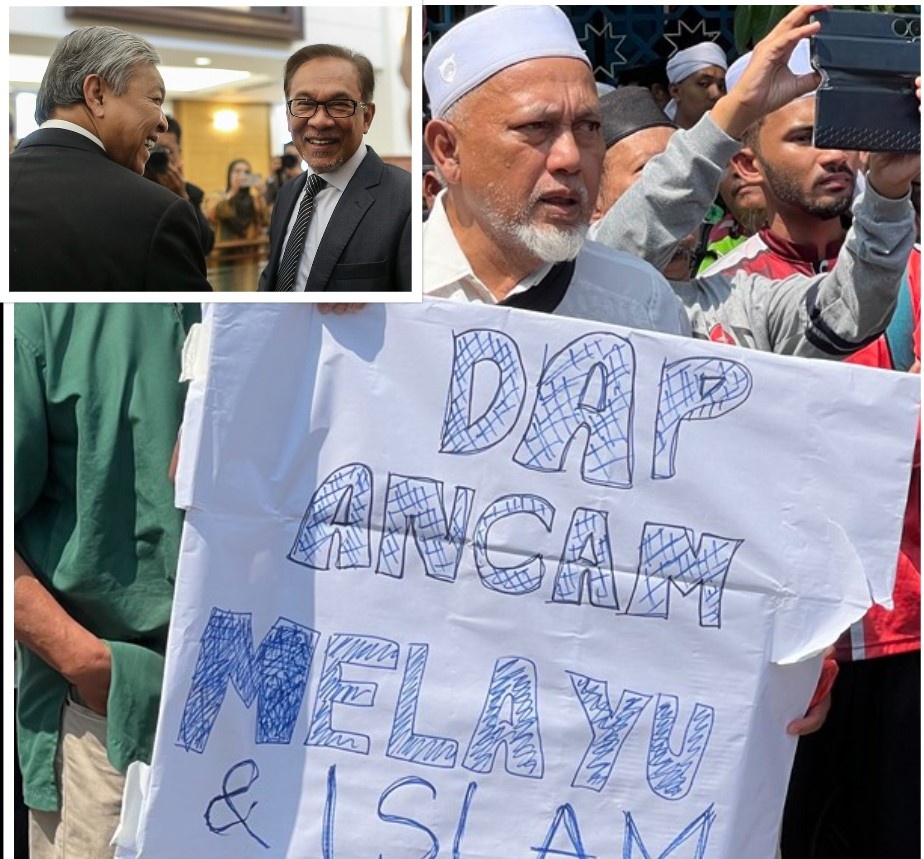
Why non-Malays must support the merger of Umno and PKR
13 Jan 2025 • 8:00 AM MYT

TheRealNehruism
Writer. Seeker. Teacher

Image credit: Malaysia Kini/ Focus Malaysia
There are 5 major Malay or Malay based political parties in Semenanjung. These are PKR, Umno, Pas, Bersatu and Amanah. These 5 Malay or Malay based parties will at some point have to merge and consolidate until only two parties remain, because until they do, the Malay identity group will not be stable.
A stable identity group is one that will have no more than two parties to represent it.
In peace time, it will have two political parties to represent it but when war is looming, it will have just one political party and perhaps even a supreme leader to represent it.
This is why in the UK, only the Conservative party and the Labour party are significant.
In America, you have the Democrats and the Republicans, although the Americans today, feeling more warlike and hawkish, seem to be gravitating towards a single party representation with Donald Trump as their supreme leader.
Singapore, which is perpetually feeling defensive in lieu of its size, has only the PAP as its sole dominant political party.
The communist party under the Kim dynasty is also the sole dominant political party of the ever hawkish North Koreans.
In China, that the Communist party under Xi Jinping are the sole representatives of the Chinese, has long been a sign that China has been on a war-mode for decades.
That there are at least half a dozen Malay or Malay inclined parties in the country today is a sign that the Malay identity group is in a weak state. If they continue in this condition, the Malay identity might split into smaller identity groups, which will then cause a suspicion that they are being deliberately broken apart by unseen enemies to take hold of their mind.
Historically, it is dangerous for a minority identity group in a polity to have the majority identity group feeling like it is weakening or threatened. This is the case, because if a majority identity group’s senses that its weakness has become palpable, it has a tendency of generating hostilities against a minority identity group to rejuvenate itself.
It was because the German identity had weakened tremendously in the post World War 1 era, that the Nazis, who rose in the post World War 2 era, had to evoke an extreme prejudice against the German Jews, in order to set the condition to rejuvenate and heal the weakened German identity.
When the Indonesian identity was facing a crisis during the Asian Financial Crisis of 1997, Indonesians of Chinese descent had to face heavy persecution as well.
In Malaysia, today, there are already signs that movements to defend the Malay identity group against an unnamed and unseen common enemy are already being bandied about.
Recently, former prime minister Dr Mahathir Mohamad and several Perikatan Nasional leaders have banded together to oppose a “common enemy” of the Malays.
Mahathir is claiming that the Malays have been gradually deprived of their rights under the unity government led by Prime Minister Anwar Ibrahim and said this prompted them to unite to champion the community.
“Malay power over ‘Tanah Melayu’ will disappear if nothing is done to prevent that from happening.
“We agree that we have a common enemy. We have to come together to face this common enemy.
“We have agreed to come together to ensure the Malays do not lose power … to bring about Malay unity to ensure they do not lose all their power,” he said at a press conference after a roundtable meeting attended by PN chairman Muhyiddin Yassin, PAS vice-president Idris Ahmad, former Umno secretary-general Annuar Musa and former Pejuang deputy president Marzuki Yahya, among others.
Recently, a couple of Dap leaders have also come under attack for “causing disharmony amongst Muslims in the country.”
All these are signs that suggests that if the Malay identity groups continues to weaken as a result of instability, movements to reverse its decline ,will continue to arise with increasing intensity, and the movement will inevitably have to apply some formof hostility and antagonism against the minority identity groups in the country in order to set the condition to stop its decline.
The only way to prevent this likelihood, is to get the 5 malay political parties in the country to be consolidated and merged into two.
The only question is, how is it going to be achieved.
PKR as the ruling party, and PAS as the biggest Malay party in the country today, will likely be the two poles of the Malay identity in lieu of their respective strength. The question then becomes, what is to be done with Umno, Amanah and Bersatu.
If one removes Amanah from the equation, on account of it being too small to be significant, the question will then become, what is to be done to Umno and Bersatu in order to achieve the aim of reducing or consolidating Malay political parties into two.
In the end, Umno and Bersatu will likely need to be merged with PKR or PAS. The only question that remains to be answered is how?
This question needs to answered faster than we assume, because not only is the instability in the Malay identity group causing upheaval in the politics of Semenanjung, it is weakening the political power of Semenanjung vis-à-vis Sabah and Sarawak as well as putting the minority identity group in the Semenanjung in a vulnerable state.
To make the matter even more precarious, we cannot underestimate the role that the 77-year-old PMX Anwar is playing in stabilising the instability in the politics of Semenajung today.
To put it bluntly, although the politics in Semenanjung is unstable due to the instability in the Malay identity group, the instability is still manageable on account of PMX Anwar stabilizing it with his charisma and skills in realpolitik.
Now imagine what will happen if PMX Anwar is no longer around to provide this stabilizing factor?
The biggest party in the ruling coalition is the non-Malay DAP while the person who is most likely to succeed Anwar in the unity government if PMX Anwar becomes out of commission is Rafizi or Zahid Hamidi. Can you imagine the level of instability that might occur if such a situation were to come to pass?
Rafizi or Zahid Hamidi cannot be expected to control DAP or provide the stabilising factor as PMX Anwar is providing.
PMX Anwar is not a young person. He is 77 years old. Expecting a 77 year old man to keep the politics in Semenanjung stable using his skills and charisma is akin to putting all of your eggs in one very well worn basket.
The long term and permanent solution to the issue of instability in Semenanjung politics depends on the stabilisation of the Malay identity group, which in turn requires the consolidation and merger of the 5 existing Malay political groups into two.
That the Malay political parties themselves do not look like they are capable of consolidating and merging, might mean that they might require the felicitation and urging of the non-Malays political representation in the country to do the necessary.
No matter how difficult, the consolidation of Malay political parties is the only feasible solution to the political stability in Semenanjung and by extension, the Federation. The only question that remains to be answered thus, is what should be done to make it possible?
Considering the age of PMX Anwar, the faster this question is answered, the better.
Supporting a merged entity to restrengthening the f*cked ketuanan narratives?
ReplyDeleteOver my dead body!